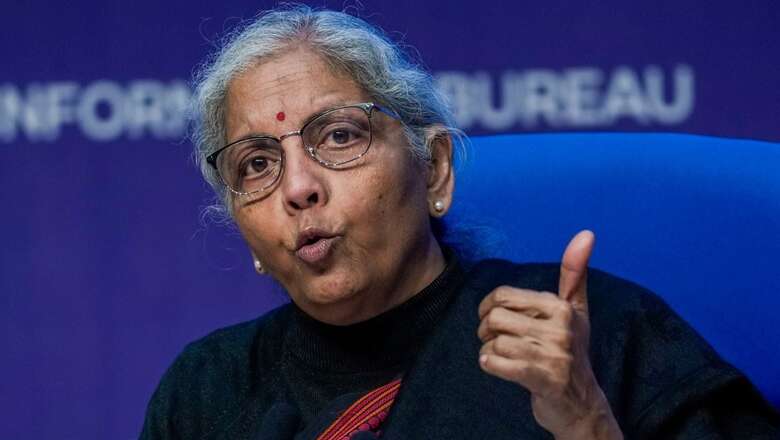
views
The Narendra Modi government is confident of managing inflation as well as maintaining the robustness in economic growth, said union finance minister Nirmala Sitharaman on Friday in an exclusive interview with Network18 Group Editor-in-Chief Rahul Joshi, a day after presenting the interim budget in Parliament ahead of the Lok Sabha elections. She also spoke about India’s growth estimates and how international organisations too are now more hopeful.
“The chief economic adviser has also commented in his preface and has elaborated how 7% is not difficult to achieve. Globally also various organisations that look at economies of all countries, like IMF, have enhanced their assessments. So upgrading our growth estimates is not just singularly our business," the minister said.
The International Monetary Fund (IMF) has raised its 2024-25 GDP growth forecast for India by 20 basis points to 6.5 per cent. It has also raised its growth forecast for 2025-26 by 20 basis points to 6.5 per cent.
“Growth in India is projected to remain strong at 6.5 per cent in both 2024 and 2025, with an upgrade from October of 0.2 percentage point for both years, reflecting resilience in domestic demand," the IMF said on January 30 in an update to its World Economic Outlook report.
While the budget does not make a forecast for real GDP growth, the finance ministry said in a report on January 29 that the Indian economy’s growth rate may be close to 7 per cent in 2024-25.
People are seeing that fundamentally a lot of activities are happening and the robustness of the economy has not slackened in any way, Sitharaman told Network18. “It has maintained its buoyancy the way with which things are happening and not just in revenue collection…So there is reason to believe, yes, it is possible," she said. “And the deflator, not just the inflation, itself is constantly…meaning we are looking at controlling inflation, the other factors fall in place so the deflator itself then plays a role, and therefore we are confident that on the one hand, we will be able to manage inflation and on the other to keep the robustness in growth so it is sustained growth."
A deflator serves as a price index in which the effects of inflation are nulled. It is the difference between real and nominal GDP.
While presenting the interim budget on Thursday, the minister said that proactive actions have helped keep the country’s inflation within the manageable range. She also said that the inflation has moderated.
The Reserve Bank of India has been mandated by the government to ensure retail inflation remains at 4 per cent with a margin of 2 per cent on either side.
Retail inflation rose at the fastest pace in four months in December 2023 at 5.69 per cent on account of an increase in prices of vegetables, pulses, and spices. The annual inflation based on the Consumer Price Index (CPI) was at 5.55 per cent in November and 5.72 per cent in the year-ago month.
“We have made every effort to look at both growth-driving elements and inclusivity-driving elements so that nobody is left out of this growth process, both to contribute and to gain from," Sitharaman said in the interview.
The government is doing many systemic reforms and these need to be brought to the attention of international rating agencies, she said. “Even as we managed Covid, we kept reforms going. I would think they do their job but periodically it’s our business also to bring it to their notice that the economy, particularly an emerging market economy like India despite the odds…we are doing a lot of systemic reforms, which are bearing the results now," said the minister. “Emphasis on reforms has continued and will do so…outside the budget also…under the carpet also. Rating agencies should look at all aspects."
















Comments
0 comment